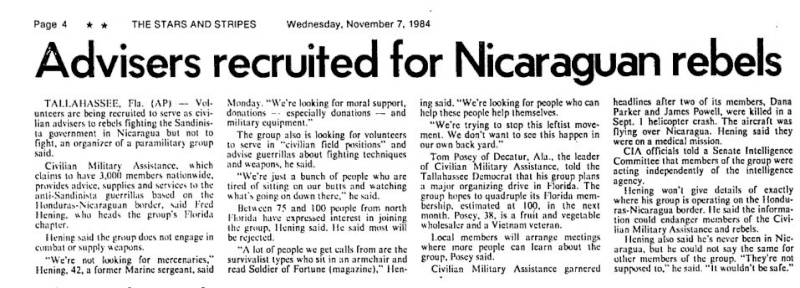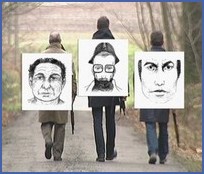http://www.nytimes.com/1984/09/23/us/mercenaries-in-fatigues-meet-in-nevade-glitter.html
MERCENARIES IN FATIGUES MEET IN NEVADE GLITTERBy IVER PETERSON
Published: September 23, 1984
LAS VEGAS, Nev. Sept. 21— If the presence of American mercenaries opposing Communists in Central America becomes an international issue, no one would appear to be happier about it than those who are doing the guerrilla training and occasional fighting.
They say that, as far as they are concerned, fighting Communism is something America has lost the stomach for, and if it takes a few freelance fighters to show the way, so be it.
''I keep saying, the only reason we're down there is because the Congress won't let anyone else do the job,''
Robert K. Brown, publisher of Soldier of Fortune, declared. ''If Washington would get its act together we wouldn't have to do it for them.''
Mr. Brown's glossy monthly magazine is full of articles about lethal weapons and military adventure. Its circulation of 200,000 has made it possible for Mr. Brown to put his publication's hearty anti-Communist message into practice by sending half a dozen military training teams, made up of veterans like himself, to train the Salvadoran Army in what he asserts are skills neglected by the 55-man United States military training team in El Salvador. The magazine pays to send its volunteers, who teach the Salvadoran Army infantry tactics and the use of weapons in the Salvadoran Government's fight against leftist insurgents. Theme of Duty Taken Up
Soldier of Fortune held its fifth annual convention here this week, and the theme of duty neglected and taken up again was a main topic among the nearly 1,000 men wearing baggy combat fatigues, grisly knives and jungle boots who strode among the bored blackjack dealers and people feeding slot machines in the Hotel Sahara casino.
''From the response we've had, we could get 1,000 of these guys down there to fight right now,'' said
Thomas Posey, a founder and leader of
Civilian Military Assistance, an effort to train and supply rebels operating out of Honduras against the Sandinista Government of Nicaragua.
Interest in unofficial United States help to anti-Communists in Central America in general and Mr. Posey in particular reached a new level recently with the shooting down of a rebel helicopter inside Nicaragua on Sept. 1. Two Americans and one rebel in the helicopter were killed.
Mr. Posey said his group was unrelated to Soldier of Fortune magazine. He was attending the convention only at the invitation of Mr. Brown, to receive posthumous awards for patriotism on behalf of the two American men killed in the downing of the helicopter, James Powell and Dana Parker, Both Were Vietnam-Era Pilots
The two, both Vietnam era pilots, were members of Mr. Posey's group, and their deaths brought widespread speculation in Washington and elsewhere about whether the Central Intelligence Agency was backing mercenaries' involvement in the region.
But like Mr. Brown, Mr. Posey rejected the notion of any Federal involvement in his group's efforts in Central America.
''Everybody says 'C.I.A., C.I.A.' like we couldn't do this by ourselves,'' Mr. Posey said.
''If the people in Washington would draw a line across the map and say, 'This is where Communism stops,' I'd go along with that,'' he went on. ''But nobody's done that yet, so we're the ones who are drawing the line. We're the ones making a stand.''
The founding of Civilian Military Assistance in a restaurant in Decatur, Ala., 13 months ago was the culmination of years of such expressions of frustration. Like Mr. Posey, all of the half-dozen founders were members of National Guard units in the Deep South and Vietnam veterans in their 30's or 40's still seething over the victory by Hanoi. They were men of ordinary lives and extraordinarily fierce anti-Communist feelings.
''We had been running into each other at meetings and kind of talking about doing something,'' said Mr. Posey, a wiry, blue-eyed man who owns a wholesale produce business in Decatur and who has a stomach ulcer that he nurses on coffee and cigarettes. 'We Decided to Send Me'
''Then when the Russians shot down Flight 007, and we knew nobody was going to do anything about it, we decided to chip in and send me to San Salvador to see what we could do.''
From San Salvador Mr. Posey went to Honduras and finally got in touch with the rebels of the Nicaraguan Democratic Force. He soon began delivering them supplies, mostly clothing.
Mr. Posey insists that everything his organization did was above board.
''We said from the very beginning we were going to do everything legally,'' he said. ''We talked to the customs department, we talked to the post office, we spent three hours being investigated by the F.B.I.,'' he said. ''The only question was about sending them weapons and ammo, but since we didn't have the money for that, it didn't matter anyway.''
The two men killed in the helicopter were teaching takeoffs and landings to the Nicaraguan rebel pilot at a base near the border, Mr. Posey said, when they suddenly took off into Nicaragua to answer a call for help. Mr. Posey said he assumed they were answering a call from rebels who, the Government in Managua said, were attacking a training camp at Santa Clara.
Mr. Posey denies that the men took part in the fight. Perhaps mindful of the fears in many Americans' minds about sending troops into another guerrilla quagmire like Vietnam, others at the convention echoed this theme, asserting that the anti-Communists merely needed training. 'They Have Fighters'
''They don't need guys to go down there and fight for them,'' said Dale Dye, a Marine Corps veteran and executive editor of Soldier of Fortune. ''They have fighters. What they need is our skills in training nonprofessional soldiers to fight.''
Mr. Dye recently returned from one of the magazine-sponsored training missions to El Salvador, where he helped teach Salvadoran troops to use the 60-millimeter mortar given them by the United States.
''They didn't even know you can fire a mortar at night,'' he said. ''I spent 20 years in the Marine Corps and I don't think I've ever had a more rewarding time in my life than when I could see the lights go on in these guys' minds when somebody finally explained to them how to use these weapons.''
Only a handful of the men at the convention were involved in the Central American fighting, however. Many were like Bill Stone of Denver, a carpenter and Marine Corps veteran.
''These guys are more fun than the V.F.W., they're more gung-ho,'' he remarked cheerfully. ''We thought it would be fun to slip on the old cammies and come on down and drink some beer and yell a lot, and that's all we're doing. As far as fighting in El Salvador, forget it!''
''Cammies'' are the camouflaged jungle wear favored by the conventioneers for casino wear.
_ _ _ _ _
http://www.myheritage.nl/research/collection-10025/newspaperarchivecom?itemId=408511143&action=showRecord
European Stars And Stripes7 nov 1984
